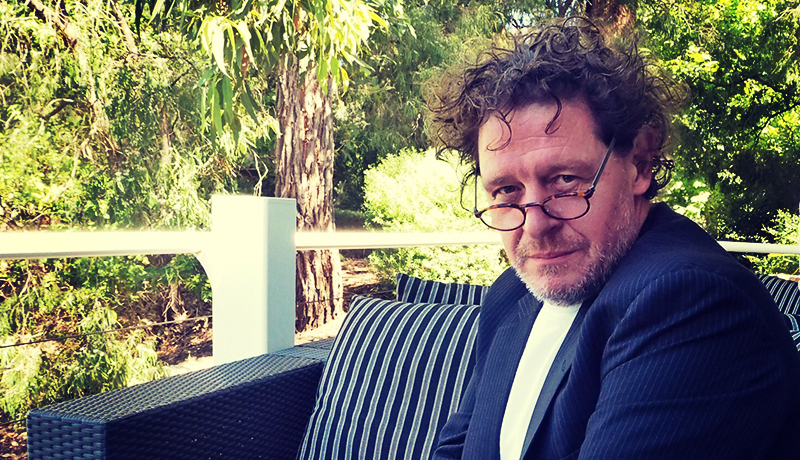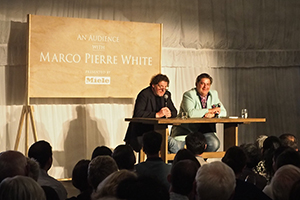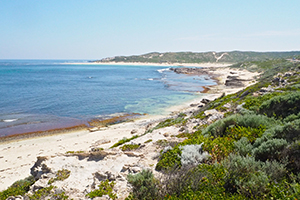

Marco Pierre White
Photo Courtesy of Veronica Meewes
Gourmands from all over Australia recently headed to the southwest coast to congregate at the Margaret River Gourmet Escape, an annual event showcasing the country’s best food and wine. Known for its lush, Bordeaux-like grape-growing conditions since the 1960s, the Margaret River region has become more of a culinary hot spot in the past several years, as chefs from across the globe are also discovering its abundant produce and unique sustainable seafood.
Since it began in 2012, Gourmet Escape has undoubtedly helped put Margaret River on the gastronomic map. In addition to a Gourmet Village boasting more than 100 local producers, as well as chef-led demos and workshops, this unique event offers more than 50 satellite events, ranging from beach barbecues and dinner on the longest jetty in the Southern Hemisphere to a didgeridoo cave experience educating guests on aboriginal ingredients.
This year brought internationally lauded chefs such as Marco Pierre White, Antonio Carluccio, Fulvio Pierangelini and Rick Stein. White, a British legend who’s widely considered one of the first true celebrity chefs, trained chefs like Gordon Ramsay and Curtis Stone. He sat down with us to discuss his thoughts on modern Australian cuisine, food media and impressions of his first visit to the western portion of the country.
In your roles as judge and co-host of MasterChef Australia, have you spent a lot of time in Western Australia?
I spend a lot of time in Sydney, a lot of time in Melbourne. But this is my first time to Margaret River and this part of Australia. It’s very beautiful — truly beautiful! Yesterday, when I drove around, just looking at the landscapes, the topography and the vineyards and the beach — very beautiful! It was very exciting being invited. It was a real treat. Very few things excite me in life and very few things impress me. This region of the world excites me. The produce here is quite magical and the wine’s delicious. It’s like heaven on earth.

White at Gourmet Escape, Photo Courtesy of Veronica Meewes
What originally inspired you to visit?
The chefs, like George Calombaris, speak with such enthusiasm for Margaret River. So I’ve known about it for three years and this was the very first time I’d been invited. And I just leapt at the chance. It’s a very, very special part of the world and I can see why every year every chef in the world dreams about being invited.
Would you call this region a world-class food and wine destination?
I think it’s more than that, actually. Because we can go to many corners of the world where you have world-class food and world-class wine and that’s represented by the chefs. When you think of where all the chefs come from in the world, they’re from every single little corner. And they come here and all leave with one thing: inspiration. It’s very special. It’s very rare.
What makes this festival stand apart from others?
It’s very understated. It’s very elegant. You look at some of the food fests and that’s just what they are — food fests. This is a food event with a difference. What’s really special is the knowledge that is shared. Everyone goes back, I would believe, a different person. Margaret River is life changing, in that sense. It inspires you and your outlook on life becomes very different.
What aspects of Australian cuisine do you find most enchanting?
What’s amazing about the food in Australia is that it’s like the most beautiful jigsaw. It’s made up of every little corner of the world all crammed into one. You have chefs from all different countries working here and, every time a chef comes to this country, they don’t just get something. They also give something back. And that’s why the food, every year, gets better and better and better. I’ve been coming here for 10 years and seeing the food and the food scene improve every single year. And let’s not forget, MasterChef Australia has done more for food in the world than any other TV show or institution. MasterChef Australia goes to 185 countries globally. It flies the flag for Australia, No. 1. It brings chefs from all over the world because of that window. It gives you insight into Australia. It gives you insight into the people. It’s quite extraordinary. And when you think 85 percent of the contestants from MasterChef enter the industry…that all contributes to this wonderful jigsaw.
Do you feel like food festivals and food TV have changed the way chefs are trained to create dishes these days?
I think TV inspires people, whether they want to cook or whether they want to eat. And let’s be honest: Cooking is one thing, but eating, without question, is the most important thing. If you look at all great chefs, they all know how to eat and that’s what makes them great. Without enjoying food, you could never cook food beautifully. You’ll never understand the true construction of food — the layers of flavor. So, the eating is equally as important as the making.

Margaret River, Photo Courtesy of Veronica Meewes
And how have those same media outlets changed the way that we share and enjoy food?
If you look, the demand and want for food programs is enormous. The demand and want for publications to write about food, and everything that comes with it, is enormous. And that inspires people. What a wonderful barometer Margaret River is. Every year, it grows, it grows, it grows. It’s now selling out. It’s not just a food show; it’s a food show with a difference. But what’s important is the foundation and the people who knit it together and put a lot of thought into what they do. It’s not just a bunch of guys and girls showing up to have a jolly. This, without question, is important to the industry and to the world of food.
What are your thoughts on the way food culture has changed in the years since you first started cooking?
If you think about what food was 30 years ago, 40 years ago, think how far food has come in every sense. People who produce food, people who make food, people who grow grapes to make wine — everything has changed. And so, therefore, it all computes, I suppose at the end of the day, to a quality of life. And that’s what it’s all about. Without beautiful food and beautiful wine, life is quite boring.
What trends do you foresee for 2016?
Firstly, I don’t like the word “trends.” [But] it’s a fair question. To say “this is the trend” makes it sound very shallow. Let’s be honest — every cook has one of two options. He or she can paddle around in the shallow end of gastronomy or can swim in the deep end of gastronomy. That’s their choice. Margaret River is the deep end of gastronomy. You don’t paddle here, you cook.
Now that you’ve retired from cooking in restaurants, what role does food play in your life?
It’s very simple. I may have strayed from the stove, but I stay very close to the flame.
